WebForum
-
 8 min readMigrating from Python to Go is a process of transitioning a codebase or application from using Python as the programming language to using Go. This migration is usually done to take advantage of Go's benefits such as better performance, concurrency support, and static typing.The migration process typically involves the following steps:Understanding Go: Developers need to familiarize themselves with the syntax, features, and idioms of the Go programming language.
8 min readMigrating from Python to Go is a process of transitioning a codebase or application from using Python as the programming language to using Go. This migration is usually done to take advantage of Go's benefits such as better performance, concurrency support, and static typing.The migration process typically involves the following steps:Understanding Go: Developers need to familiarize themselves with the syntax, features, and idioms of the Go programming language.
-
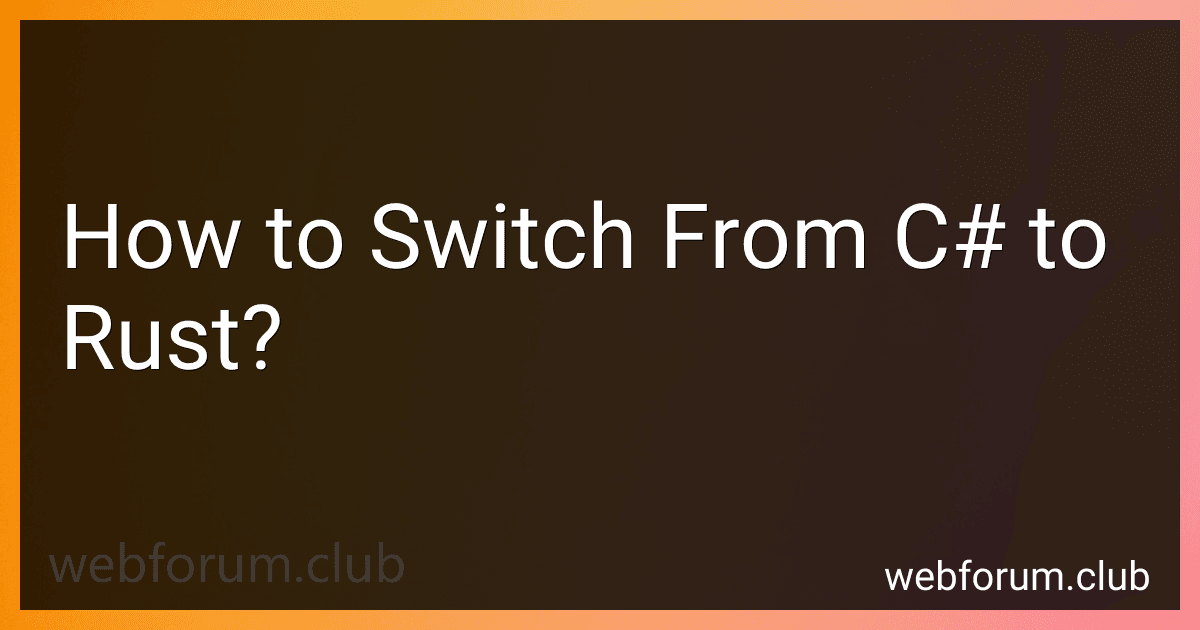 8 min readSwitching from C# to Rust involves learning a new programming language and understanding its syntax and concepts. Here is an overview of the process:Start by familiarizing yourself with Rust's syntax: Rust has a different syntax compared to C#. Take some time to go through the official Rust documentation to understand the language's unique features, such as its ownership and borrowing system.
8 min readSwitching from C# to Rust involves learning a new programming language and understanding its syntax and concepts. Here is an overview of the process:Start by familiarizing yourself with Rust's syntax: Rust has a different syntax compared to C#. Take some time to go through the official Rust documentation to understand the language's unique features, such as its ownership and borrowing system.
-
 5 min readMigrating from C++ to Ruby requires understanding the differences in syntax, structure, and programming paradigms between the two languages. Here are some key points to consider during the migration process:Syntax Differences: Ruby has a more concise and expressive syntax compared to C++. It employs dynamic typing, meaning that variables are not explicitly declared with a specific type. Additionally, Ruby uses indentation to define code blocks instead of braces.
5 min readMigrating from C++ to Ruby requires understanding the differences in syntax, structure, and programming paradigms between the two languages. Here are some key points to consider during the migration process:Syntax Differences: Ruby has a more concise and expressive syntax compared to C++. It employs dynamic typing, meaning that variables are not explicitly declared with a specific type. Additionally, Ruby uses indentation to define code blocks instead of braces.
-
 8 min readMigrating from Java to Java refers to the process of transferring or updating existing Java applications or projects to a different version of the Java platform. This could involve moving from an older version to a newer one, or transitioning from one implementation of Java (such as Oracle's JDK) to another (like OpenJDK).There can be several reasons for migrating Java codebases.
8 min readMigrating from Java to Java refers to the process of transferring or updating existing Java applications or projects to a different version of the Java platform. This could involve moving from an older version to a newer one, or transitioning from one implementation of Java (such as Oracle's JDK) to another (like OpenJDK).There can be several reasons for migrating Java codebases.
-
 10 min readMigrating from Java to Go is a process that involves transitioning a software project from using the Java programming language to using the Go programming language. This migration may be driven by various factors such as performance, resource usage, simplicity, or the desire to leverage the features and benefits provided by Go.One of the primary motivations behind migrating to Go is its efficiency and performance.
10 min readMigrating from Java to Go is a process that involves transitioning a software project from using the Java programming language to using the Go programming language. This migration may be driven by various factors such as performance, resource usage, simplicity, or the desire to leverage the features and benefits provided by Go.One of the primary motivations behind migrating to Go is its efficiency and performance.
-
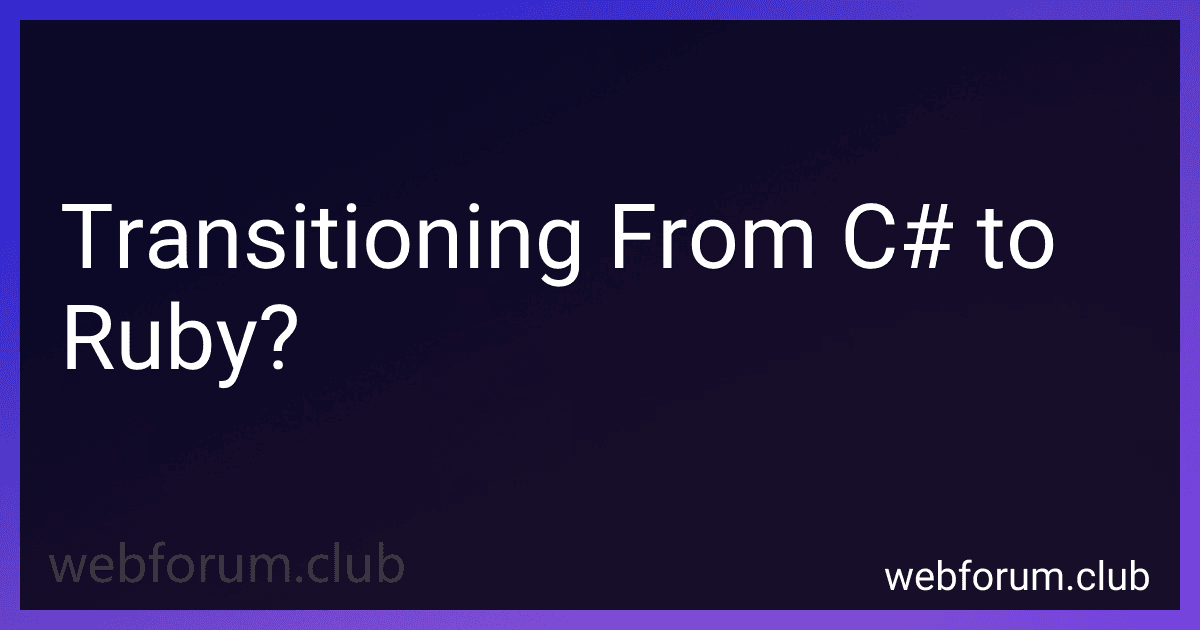 7 min readTransitioning from C# to Ruby can be an exciting and rewarding journey for developers. Ruby is a dynamic, object-oriented scripting language known for its simplicity, readability, and flexibility. However, there are some key differences to consider when making the switch.One of the first things to note is that Ruby is interpreted, while C# is compiled. This means that in Ruby, you can write code and run it immediately without the need for a separate compilation step.
7 min readTransitioning from C# to Ruby can be an exciting and rewarding journey for developers. Ruby is a dynamic, object-oriented scripting language known for its simplicity, readability, and flexibility. However, there are some key differences to consider when making the switch.One of the first things to note is that Ruby is interpreted, while C# is compiled. This means that in Ruby, you can write code and run it immediately without the need for a separate compilation step.
-
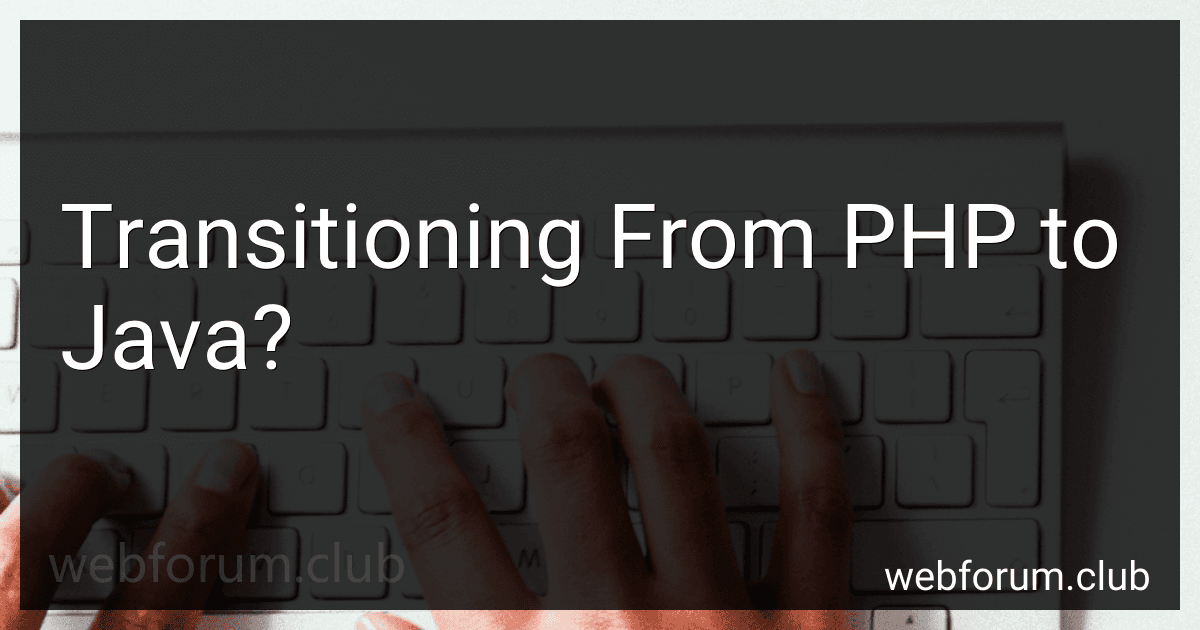 7 min readTransitioning from PHP to Java can be an exciting and challenging process for developers. While PHP is a popular scripting language used primarily for web development, Java is a versatile and powerful programming language that can be used to build a wide range of applications and systems.One of the key differences between PHP and Java is their syntax. PHP has a C-like syntax, making it relatively easy for developers to learn and understand.
7 min readTransitioning from PHP to Java can be an exciting and challenging process for developers. While PHP is a popular scripting language used primarily for web development, Java is a versatile and powerful programming language that can be used to build a wide range of applications and systems.One of the key differences between PHP and Java is their syntax. PHP has a C-like syntax, making it relatively easy for developers to learn and understand.
-
 13 min readIn this tutorial, we will discuss the process of migrating from PHP to Rust. PHP and Rust are both popular programming languages, but they differ significantly in terms of performance, memory usage, and safety. Migrating from PHP to Rust can result in a more efficient and secure codebase.The process of migrating from PHP to Rust involves several steps. Firstly, you need to understand the Rust programming language and its key concepts.
13 min readIn this tutorial, we will discuss the process of migrating from PHP to Rust. PHP and Rust are both popular programming languages, but they differ significantly in terms of performance, memory usage, and safety. Migrating from PHP to Rust can result in a more efficient and secure codebase.The process of migrating from PHP to Rust involves several steps. Firstly, you need to understand the Rust programming language and its key concepts.
-
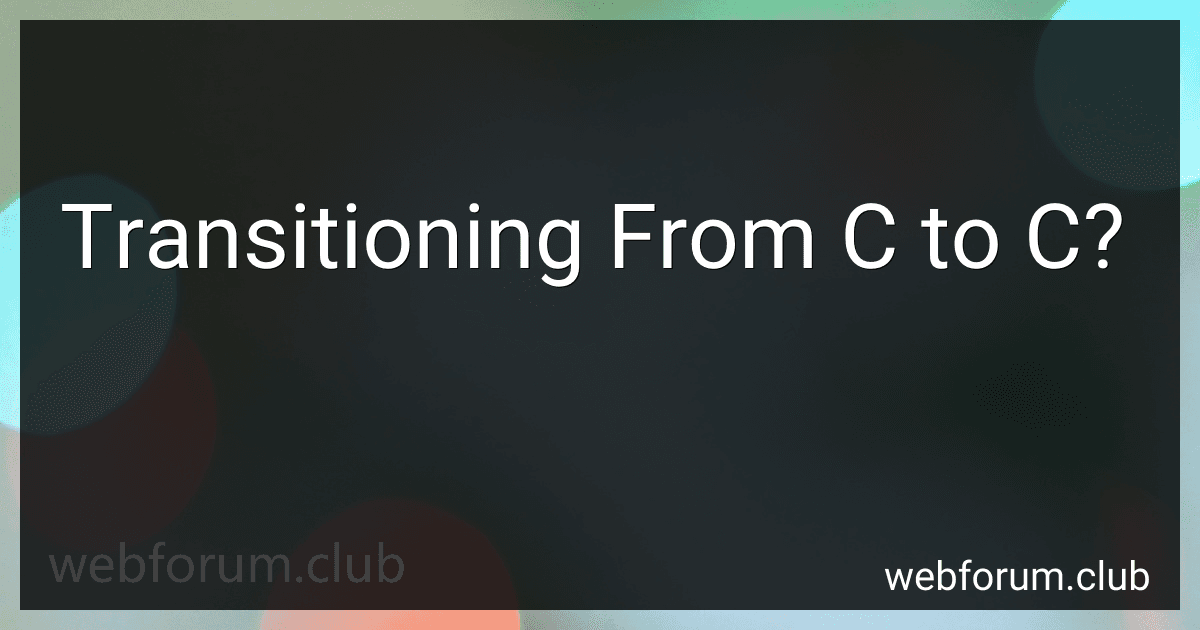 10 min readTransitioning from C to C++ involves moving from a procedural programming language to an object-oriented programming language. Both C and C++ share similar syntax and features, but there are significant differences between the two.One major difference is that C++ includes the concept of classes and objects, which allows for the implementation of encapsulation, inheritance, and polymorphism.
10 min readTransitioning from C to C++ involves moving from a procedural programming language to an object-oriented programming language. Both C and C++ share similar syntax and features, but there are significant differences between the two.One major difference is that C++ includes the concept of classes and objects, which allows for the implementation of encapsulation, inheritance, and polymorphism.
-
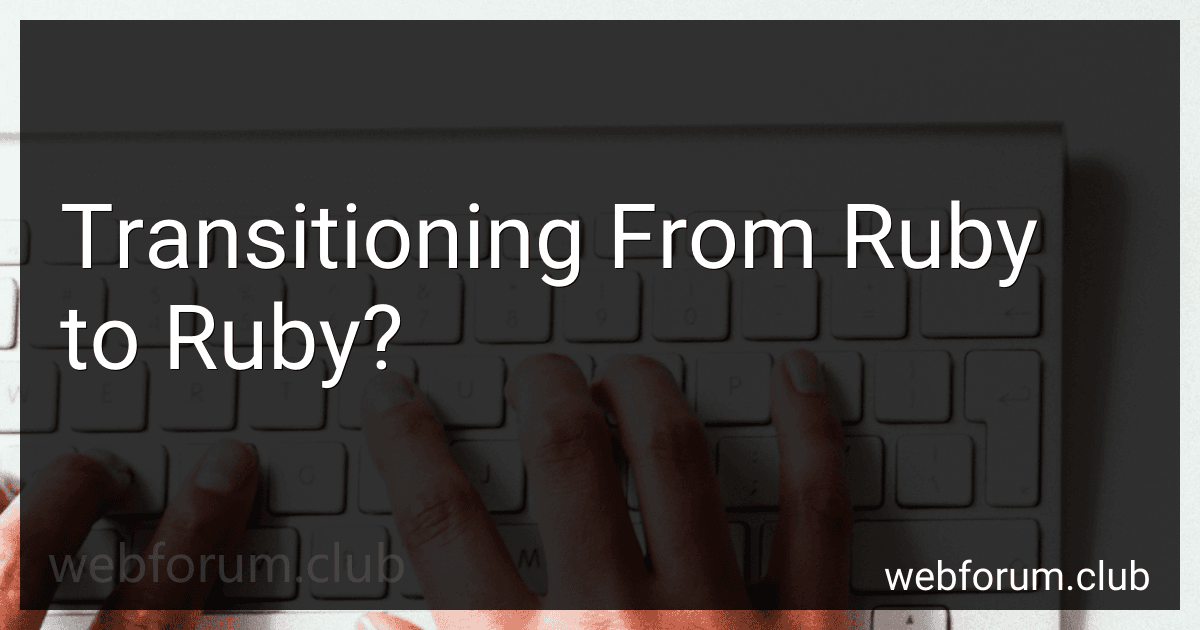 9 min readTransitioning from Ruby to Ruby refers to the process of learning and adapting to new versions or updates of the Ruby programming language. This transition typically involves gaining knowledge about the new features, syntax changes, and improvements introduced in the latest Ruby version.As a developer, transitioning from one Ruby version to another is essential to stay updated with the advancements in the language and to leverage the new functionalities provided by the updated version.
9 min readTransitioning from Ruby to Ruby refers to the process of learning and adapting to new versions or updates of the Ruby programming language. This transition typically involves gaining knowledge about the new features, syntax changes, and improvements introduced in the latest Ruby version.As a developer, transitioning from one Ruby version to another is essential to stay updated with the advancements in the language and to leverage the new functionalities provided by the updated version.
-
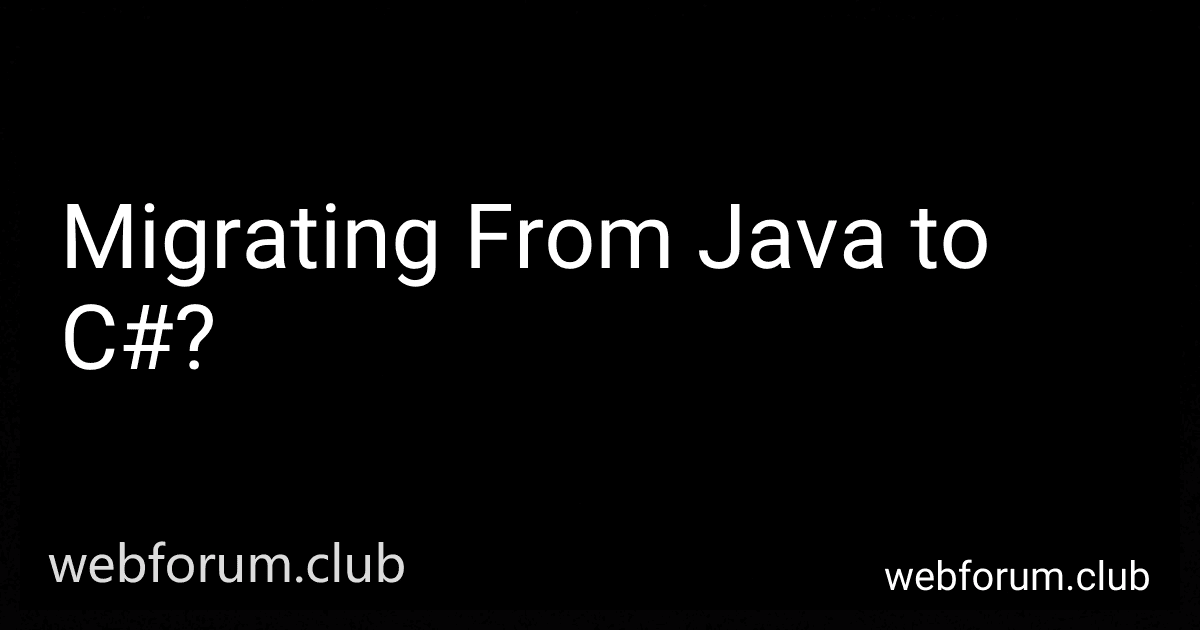 6 min readMigrating from Java to C# involves transitioning software development projects and code bases from the Java programming language to the C# programming language. It requires developers to adapt their coding techniques, libraries, tools, and frameworks to the new language and ecosystem.One of the first challenges is understanding the syntactic differences between Java and C#. Although both languages are influenced by C/C++, they have distinct syntax and language features.
6 min readMigrating from Java to C# involves transitioning software development projects and code bases from the Java programming language to the C# programming language. It requires developers to adapt their coding techniques, libraries, tools, and frameworks to the new language and ecosystem.One of the first challenges is understanding the syntactic differences between Java and C#. Although both languages are influenced by C/C++, they have distinct syntax and language features.